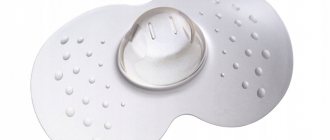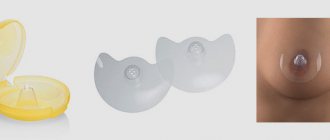What to do with your breasts when you stop breastfeeding?
No matter how beneficial breastfeeding is for mother and child, it must be stopped at some point.
And now, after much thought and doubt, the question is behind us: how will we wean the child? But there is still a question ahead that is no less important for the mother’s health: what to do with the breasts during the period of cessation of lactation?
Quite recently this question touched me too.
Let me make a reservation that I successfully and happily breastfed myself and my baby for 1 year and 10 months.
I prepared for weaning gradually over more than 2 months.
However, I had to stop breastfeeding a little earlier than scheduled because I ended up in the hospital. It was then that I remembered and analyzed ways to suppress lactation: 1. Breast ligation is known to our grandmothers and great-grandmothers. Its essence lies in completely expressing the breast and tying it with a towel or diaper. This process is performed at least 2 times.
However, when dressing, the risk of lactostasis and mastitis increases.
This is due to impaired blood circulation in the tissues of the mammary glands, blockage of the ducts with milk clots and the development of edema.
If this method is still close to you, then it is better to find a person who can bandage you correctly. 2 . More recently, pills have appeared to suppress lactation .
In order for the milk to “burn out”, you need to drink the course according to the scheme indicated in the instructions. These drugs should be treated very carefully and used only as a last resort when you need to abruptly stop milk production.
All medications have a hormonal composition that affects brain function.
Therefore, their use may be associated with serious side effects: nausea, vomiting, dizziness, headache, fatigue.
Therefore, you should consult your doctor or lactation consultant before choosing and taking lactation suppression pills. 3. The natural way to suppress lactation is based on attention to your body and the processes occurring in it. It is known that when a baby is applied to the breast, an impulse is sent to the pituitary gland, which stimulates the release of the hormone prolactin, which encourages the mammary glands to secrete milk. Therefore, the fewer applications, the less milk. Those. This method is based on the fact that the mother does not express her breasts completely, but only slightly pumps them when she feels full. This causes milk to stop being produced and gradually disappear. During this period, breast massage is performed to relieve pain and prevent congestion. In this case, special attention should be paid to the mammary glands located near the armpits and lower chest. It is advisable to wear a well-supporting bra during this period (even at night). If the cessation of lactation occurs after the child is one and a half years old, then the breasts stop filling and the pain goes away after three days. If before this age, then it takes a little longer (up to two weeks). By the way, I chose the latter method as the most natural and convenient for the body. After all, such a unique period of life as breastfeeding, both for the child and for the mother, should end as gently and comfortably as possible, so that we look forward to its repetition.
VELVET: Bubnova Vera
Lactostasis, stopping breastfeeding, my story.
On November 27, Mother's Day, I gave birth to Sasha. Sasha ate my colostrum, but swallowed a lot of air and regurgitated almost everything he ate. Then I started feeding him in very small portions, keeping him in a constant column. In general, in the first three days we got used to it and adjusted to each other, although the pediatricians scared that he had already lost 300 grams and that he needed to be given formula. To which I said that I don’t want formula, I’m completely for breastfeeding, the next day another pediatrician came and said that under no circumstances should I give formula, I have a lot of colostrum, we’ll supplement it with glucose so that I don’t lose even more.
On the second day after giving birth, the pediatrician came to me and said that my boy had a heart murmur and would do an ultrasound. An ultrasound showed a heart defect, they suggested that the baby go to the cardiology building of KGB No. 67 for examination, and they said that I had to give my consent or refuse by the evening. Everything is completely free. I talked to my family and we decided to go to bed.
Sasha was taken from the maternity hospital by ambulance to the hospital, and I went home.
Upon arrival home and calling this hospital, it turned out that there were no places for mothers now, and that while he was there he would be there without me.
The next day we went there to meet with the doctor. The diagnosis was confirmed: congenital heart defect, gastric septal defect, 7.5 mm in diameter.
They said that surgery is not needed yet, that this defect is in the muscle part, and that there is a high probability that the gap will close on its own, but for now we need to observe. You will need to bring expressed milk every day until space becomes available.
We arrived home, started reading the internet, and decided to pump every three hours to maintain lactation. At night too, i.e. I pumped even at 12 at night, and at three and six in the morning. At the next meeting with our attending physician (God bless her, a pediatrician from God) it turns out that our baby does not accept food, they feed him, hold him in a stack for half an hour, but he burps everything, either at once, or he can burp in an hour, or in two hours. Even the anti-regurgitation mixture does not hold. Just like in the maternity hospital, only now he needs a little more food, so the situation has become worse. We did an examination. Diagnosis: pylorastenosis with subsequent suspicion of pylarostasis. To put it simply, the passage from the stomach to the intestines is very narrow, and food stagnates in the stomach. And then maybe this passage will either decrease completely, then you will have to have an operation, or it will increase with the development of the digestive system and he will recover without surgery.
They said that he doesn’t need my milk yet, that he receives food through a tube. They showed it to us only through glass.
I cried every day and pumped. It was very difficult when I gave birth, I came home, and the child was not at home. I couldn’t think about anything, I couldn’t sleep, although I was completely exhausted.
We decided to freeze the milk so it wouldn’t go to waste. I expressed with an Avent manual breast pump.
Soon I began to notice that if you touch the chest in some places, it’s as if you’re pressing on a bruise, and there’s a small lump there. I asked my gynecologist about this. She said it's normal. After reading the Internet, I realized that this could turn into lactostasis, I began to massage my breasts before pumping and then when there was milk left in my breast, but the breast pump was no longer sucking it out much, I also massaged it, then pumped. There was always some milk left in the breast, because... I read that you don’t need to express until you are completely empty. My mother helped me a lot with this, she also massaged me. Not too much, the massage was light. I began to notice that the lumps disappeared, the pain went away, but the lumps could appear in other places, and the pain too, but we still massaged it and everything disappeared. Because I couldn’t sit because of the stitches, so all the pumping was done while standing, all this was wildly exhausting, and the lack of sleep took its toll.
Two weeks passed like this. Sasha began to digest a small amount of food: 15 ml. They said that a place had opened up for me and that I could come to him every day, bottle-feed him with an anti-regurgitation mixture, and go home in the evening. I began to go to him every day. When I asked our doctor how best I should pump, she answered that it’s optimal every three hours, but there’s no need to pump at three in the morning: “get some sleep while you can.”
And so I stopped pumping at three, got up at six with very swollen breasts and pumped twice as long. Another week passed like this. In the hospital, I also pumped every three hours. She poured the milk into the sink. Sasha began to absorb more of the mixture and switched to 40 ml. And he began to slowly gain weight. One day our doctor came up and said that I could give 40 ml of formula and 10 ml of my own milk. I was so glad! Finally he will suck my breast. It was such happiness. And he learned it well. Didn't spit up. True, each time I kept it in a column for 40 minutes.
I must say that even during pregnancy I was determined to breastfeed, I am completely in favor of guards.
One day I discovered another “bruise” in the upper part of my chest, I paid more attention to this place during the massage, but it did not go away, and about two days after it appeared, my temperature rose to 38. At first I didn’t understand why the temperature was, because... To. I had a sore throat and suddenly had an acute respiratory infection. I left the hospital urgently home, in the evening at home I cleared up well and the temperature dropped to 37. Then it became clear that most likely the problem was in the chest. And then I became scared, having read about problems with lactostasis and mastitis. And then 4 days of hell began, pumping at three-hour intervals and all the troubles before that were just a fairy tale.
I woke up at 12 at night to express, I was pounding heavily, I took my temperature - 39. I expressed. It became easier, but the temperature did not drop. An ambulance was called. Uncle has arrived. He told me to express myself and left. Then I set the alarm clock for six in the morning. And that was my mistake, because... at six I woke up with a temperature of 40.3. I wasn’t just pounding, but shaking, so that I couldn’t get up for a long time. Then I gathered my strength, stood up, could barely hold the breast pump, expressed a little, realized that I couldn’t stand and lay down again. stopped pounding. They called an ambulance again, the same guy came, gave me an injection, I felt better, I pumped until the end.
Paracetamol and Nurofen did not help. I also took Noshpa.
I must say that I only wore a bra in the hospital, at home I never had anything squeezing my chest, I only slept on my back.
In the morning we went to see a mammologist. Lactostasis says - express yourself.
We pumped and spent the whole day making calls. One breastfeeding consultant told me over the phone that there is no need to massage the breasts under any circumstances, because... the tissues there are soft and microtraumas can occur, only cabbage leaves, a semi-alcoholic compress of calendula tincture and water, a shower or bath, and Traumeel S. But we decided to call a breastfeeding consultant after all. She cleared me up. It was painful, of course it’s not the kind of pain that makes you climb up the wall, but it was very unpleasant. When I asked if she was pressing too hard, the answer was “I don’t think it’s pressing too hard.”
She drained both breasts, removed the lumps, the temperature completely went away, and it became much easier.
She said that while there is no baby, we express in this way: we express one breast every half hour for two hours, we do no more than 7 pumps to lighten the breast. It is more convenient to express by hand. Next, do the same with the other breast, but don’t touch the other for two hours. And so on all the time. Once every two hours on one breast.
This is necessary so that the milk does not stagnate in the breast. I did this for the rest of the evening and night. The next day I found two bruises on my chest from her “pressures.” Their breasts hurt, as if they were already one big bruise due to such abuse. But I continued to express according to her scheme. I also showered, took a bath, applied a compress, a cabbage leaf, smeared with traumeel and drank noshpa. That same day I went to the hospital for an ultrasound. I started drinking mint and sage to have less milk.
In the evening I discovered that the lumps were appearing again and the temperature was rising again.
They called the consultant who pumped me, told her about the bruises, and that I had a fever again, and asked what antibiotic to take, because... I was very afraid of complications and mastitis. And at the same time this throat will heal, otherwise it never went away for me. Infection should not be ruled out either. She recommended me an antibiotic that can be used for guards. And I was very surprised that there were bruises. My mother and I massaged and strained for two hours. The temperature did not drop. Then I called my gynecologist. She said that I needed to buy progestumgel. This is a gel. It will dilate the ducts well, no need to massage anything. She told me to express only with a breast pump. I did not prescribe an antibiotic over the phone.
We ran out and bought this gel, smeared it with Traumeel and then with this gel. They massaged and expressed.
Time has finally stopped for me; for three days now I have been living from pumping to pumping, with practically no time to sleep or eat. My family also slept little and helped all the time.
On the fourth day we called the hospital to ask how Sasha was doing. They said that he had an ultrasound done, that the passage between the stomach and intestines was expanding, and that they would cancel the antispasmodics and see how he reacted to it. At least one good news. I told the pediatrician what was happening to me, she said to go to the surgeon.
I ran to the surgeon. He says it’s not my case, come to me if you have mastitis and need to be cut. I came for an ultrasound, they decided to do UHF for me, because... The ultrasound didn’t help me the first time, but it should have. After UHF, the temperature went away, thank God, and did not rise again.
In between visits to doctors, I came home and pumped again, fortunately my husband was on vacation. I took him everywhere. Then there was the last option - a gynecologist. I came to her appointment already blue-green from all this, she looks at my breasts and says that if this continues for two more days, then I will have to take pills to stop lactation, otherwise we will lose my breasts. I ask her to prescribe me pills now, because... I have no more strength. She looked at me, crying, and said when the baby will return home. I'm talking Monday. And now it's Friday. Three more days. He says can we fight? The baby will come and suck. How will it suck if he’s been sucking on a pacifier for a month in the hospital? The pediatrician immediately warned that he would suckle, but he would not dissolve the stagnant milk that would come out easily.
Then the gynecologist immediately prescribed Dostinex. One tablet at night and wear a tight bra. If lactation does not go away, then take another tablet the next night. Don't pump. The seals will go away on their own. Avoid eating high-calorie foods and drink less.
I drive home with tears in my eyes. I understand that it is better to interrupt this torment, but at the same time I don’t want to, I suffered for so long and maintained lactation. There was a mood: only GW. But with my mind I understood that I couldn’t stand it even for a day, every pumping session was like being shot. Yes, and I won’t be able to breastfeed Sasha yet, because... The pediatrician said that even with these antibiotics he will not be able to breastfeed. And that it doesn’t matter as long as he is on an anti-regurgitation mixture. Those. when he comes home, I will constantly pump and suffer, and there will be no time to care for my son.
How hard it was to resolve all of this. I loved breastfeeding Sasha so much, I loved that I had milk so much that I could feed my son with this milk, but fate decreed otherwise. I took one Dostinex tablet and went to bed. I read a lot of reviews and side effects, but I didn’t have a headache or feel sick. Nothing. At night, my chest started to swell, but it didn’t hurt. The whole day the milk leaked on its own and made my chest burst, but compared to the previous torments it was nothing. only weakness and depression, but that was there even before the pill.
All my relatives reassured me. Most of the children in our family grew up on IV, and that the child needs a healthy, calm mother.
Yesterday I took the second pill at night. The chest is also bursting and still itching. But I don't touch her. It is unclear when the milk will go away.
Tomorrow we'll pick up Sasha. My husband will finally see his son not through glass)))))
Look for the golden mean!
As mentioned above, weaning is always stressful for the baby. Therefore, try not to intensify it: do not leave home, and under no circumstances begin this process while the child is ill. Pediatricians and psychologists do not recommend replacing the breast with a pacifier (then the child will have to be weaned off it as well). Stay close, give your baby your love and warmth so that he does not feel rejected.
And finally, don't rush to stop breastfeeding too early. After all, breast milk is the best nutrition that nature has come up with for a baby. However, you should not delay the weaning, so as not to miss the favorable moment. Otherwise, breastfeeding turns into a painful attachment of the child to the mother, which exhausts both mother and child: the baby is constantly “hanging” on the chest, and the mother’s life is completely subordinate to the little “monster”. So look for a middle ground!
Express Your Reaction
Similar articles:
Cancer is not a death sentence
What to do so as not to be afraid of breast cancer Tatyana did not immediately learn about the diagnosis: at first she was...
Preparing to breastfeed
We are lucky: the time is not war or even post-war, but completely peaceful and calm. Which means...
Breast pain isn't just for women
Gynecomastia (in common parlance – male breast enlargement) is a disease that, although I’m not…
Breast cancer prevention
Breast cancer is one of the most common cancer diseases. According to statistics, in Kazakh...
Breast augmentation without surgery: myth or reality?
According to statistics, about 60% of women are dissatisfied with the shape or size of their breasts. You can, of course,...
Breast reduction doesn't hurt at all
“Breast reduction? Yes, you must be crazy! God gave such wealth, and you are about to cut it! Your...
NEW LEVEL
Priscilla Stevens is a doula, birth coach, lactation consultant, nutritionist, herbalist, musician, and mother of six beautiful children. From 1991 to 1993, Priscilla lived in Russia (Irkutsk, Novosibirsk, Moscow), collaborated with the Red Cross, which provided humanitarian assistance to hospitals, orphanages and schools during the Perestroika period.
Weaning depression (post-lactation depression)
In the last few years, the problem of postpartum depression has received a lot of attention, and this is very justified. The purpose of a woman is finally revealed in the process of enormous work associated with the birth and nurturing of a little person. As grueling and difficult this process is at times, so great is the reward.
Postpartum depression can be very draining and make caring for your baby many times more difficult than it actually needs to be.
In the past, this problem was not given importance. The woman felt pressure from her loved ones who did not understand her condition; she did not know who to turn to for help and support. Fortunately, now most women experiencing postpartum depression know that they can turn to certain organizations for help; there is no need to be ashamed or hide this.
We are only now beginning to understand how wide the range of different events, as well as hormonal changes that occur at different stages of a woman’s life, affecting her behavior. Many women are familiar with premenstrual syndrome, tearfulness in early pregnancy, emotional outbursts that occur during childbirth, postpartum depression of the “third day” and its subsequent intensification, decreased libido during breastfeeding, etc. But until now, there has been virtually no discussion of depression that occurs after weaning .
Any woman who has had a successful breastfeeding experience knows that breastfeeding is a very enjoyable process and a special bond is formed with the baby. You can fall into a blissful slumber while your baby sleeps at your breast. And this opportunity quickly becomes a habit. During breastfeeding, the brain produces numerous hormones that, traveling through the mother’s body, allow her to feel truly blissful.
When a woman experiences such positive emotions and sensations associated with breastfeeding and the special relationship with her baby for a long time, stopping this process can cause a huge shock to the body. The difference between the lactation period, which provides hormonal bliss during feeding, and the state of the body after lactation, the cessation of these processes and sensations, can be compared like night and day. It is this difference that provokes emotional outbursts and the depressed state of a woman.
I am a mother of six children, and between 1993 and 2005 I was either expecting or breastfeeding. As you can imagine, I had quite a lot to do, but that didn't stop me from feeling my purpose in life. I knew what, why and how to do. A very specific relationship is built between mother and child: the one who cares and the one who receives care. A large share of communication with older children was woven into my feeding relationship with my youngest child. I had to take care of the baby and feed him milk, and the older children just had to accept it. I paid a lot of attention to them, and at the same time, the youngest was always in my arms, so very often we spent our joint activities: games, reading, etc., in a close circle, like puppies, snuggled up comfortably to each other.
Breastfeeding has always been an important part of motherhood for me. My mother breastfed seven of my siblings, and I always knew that I would definitely breastfeed my children too. I weaned my older children shortly before the next baby was due. But with Fiona it was different. This is our sixth child and we did not plan to have children in the future. Knowing that this would never happen again in my life, I changed my approach to communicating with my child. I truly enjoyed every moment of her babyhood and breastfeeding. I finally learned to completely relax and contemplate, listen to the child, to all the subtleties associated with caring for him, to wake up in the middle of the night without feelings of annoyance and disappointment; changing diapers, potty training, everything truly brought me pleasure and joy.
When Fiona was 2.5 years old, we only had night feedings left. At this time, I decided to travel and visit relatives in Canada and the USA. I knew that after we had been apart for several weeks, Fiona would most likely not remember the breasts when I returned. I needed to prepare my body for the end of lactation by eliminating feeding at bedtime and gradually reducing night feedings. It was necessary to learn new ways to calm the baby and put him to sleep without breastfeeding. The milk gradually became less and less, although I had to go through several lactostasis before achieving the desired result.
And so, when my mother and I went on a trip to the USA and Canada, everything went wrong in the small hormonal world of my body. I was grumbling and irritable more than usual, my condition was aggravated by toothache. But still, the trip turned out to be wonderful, memorable, and joyful. We visited my maternal grandmother and other relatives whom I had never met before. During the trip, “unexpected” things happened to me, indicating that something was wrong with my body: I began to cry at the sight of my cousins feeding their babies, I felt my hands, they were empty, nothing could to fill them, there was nowhere to hide them. I was very sad. Moreover, as soon as I heard the baby cry, the milk began to flow and leak, and I had to change clothes.
Upon returning to Australia, I started having terrible mood swings. One minute I was filled with happiness and enthusiasm, and now I was overwhelmed by despondency and blues. And so on in a circle, for no apparent reason. I learned to make sure that each day was filled with enough physical activity, and I tried to go to bed on time, as much as possible for a mother of many children, otherwise I would not sleep all night. However, my brain reacted to the slightest noise at night, and I would wake up repeatedly, even if I slept well.
My menstrual cycle was restored every time my youngest child began to sleep at night for 5 hours in a row, or during the introduction of complementary foods, i.e. at approximately 6 months of age. The duration of the cycle was about 6 weeks, obviously under the influence of breastfeeding and the specific hormonal background of the nursing mother. After Fiona's weaning, PMS turned into a complete nightmare for me: if sudden attacks of tearfulness began, my period would begin in a couple of days. It was like I was a teenager again.
During the same period of my life, I began my activity as a doula, which means I began to meet breastfeeding women more often. And every time I found myself next to a woman who had just given birth to her baby, I experienced a rush of milk. The atmosphere inherent in the events that took place brought tears to my eyes and a spasm in my throat, which I had to skillfully cope with. At the same time, I only observed and supported another person gaining new life experience of big changes.
In fact, these experiences have helped me to some extent in dealing with older children who are quickly turning into teenagers. I learned to manage my mood swings, and this helped me to be more sensitive and understand the feelings and needs of children. Sometimes I felt incredibly lost, even the knowledge that my children were with me, and they still really needed me, did not help me. It was as if my body and mind could not come into balance.
I won’t say: “One day I woke up and realized that everything had changed, I felt better.” Change came slowly. Over time, I realized that I felt like a normal person, and the mood swings that I had lived with for so long smoothed out. I also noted that my experiences during labor and delivery had changed. I felt more happiness and joy for my new family, and there was no longer that painful feeling associated with the fact that I would never again experience the joy of having my own child. Now I was simply happy at the opportunity to be present at the birth of the baby.
Several years have passed since I realized that I had gotten out of my problems. And since then everything has been great!
Below I will describe the actions with which I managed to cope with the crisis. But first, I would like to note that professional psychological support really helped me see my condition from the outside. Depression can sit deep inside, and a person depressed by this condition often does not realize how bad he feels and what the reason is. If your loved ones notice changes in your behavior and say you need help, there is a good chance that talking to a psychologist may do more good than harm, even if you are not clinically depressed.
Recommendations for combating depression and mood swings associated with the end of breastfeeding:
#1 – Regular exercise
It would seem that the fact that you need to pay attention to physical activity for the sake of your own health is obvious. But perhaps not everyone knows that physical exercise promotes the production of pleasure hormones, which provide a natural lift in mood, especially if it is an active load. The intensity level of classes is individual. I discovered yoga, Pilates, brisk walking, and realized that they work wonders. It is better to exercise in the fresh air, since this way the brain and the body as a whole receive more oxygen.
#2 – Breathing
Do you remember the feeling of tightness in your chest when you feel tense? This sensation occurs when you breathe very quickly and shallowly, and your lungs do not completely fill with air. Try breathing more steadily for a few minutes. When you experience this tight feeling, relax your shoulders, close your eyes and breathe slowly and deeply until you feel relief and less tension.
#3 – Sleep mode
If possible, try to go to bed and get up at approximately the same time. Regular moments help the body regulate hormonal levels. Get into the habit of turning off all electronics in your home 2 hours before going to bed, as bright lights from electronic devices activate the adrenal glands, which produce adrenaline. Subdued light imitates the setting sun. All this will help you and your children get ready and go to bed easier.
#4 – Watch your diet
Try not to overindulge in foods containing caffeine, sugar and starch to compensate for fatigue. An excess of these substances negatively affects health and interferes with the establishment of hormonal balance in the body. Make sure you get enough protein and fat in your diet. Even if you are trying to lose weight, fats will help with this. The brain is 60% fat, which is what makes up the cell membranes throughout the body. Fats take an active part in the process of regulating hormonal levels. Coconut, olive, sesame, flaxseed, butter, saturated animal fats, nut butters, nuts, avocado, avocado oil, cod liver, fatty cold-water fish are a huge selection of excellent sources of fats and oils that require minimal processing. By consuming enough protein and fat, you won't need as much caffeine. If you already have a caffeine addiction, you can gently and gradually reduce your caffeine intake with a protein-fat diet to avoid withdrawal headaches.
#5 – Have fun
Have fun and have fun every now and then. Fool with the whole family, love each other. Grow your relationships. Organize hen parties, go to the spa or the beach, or go to the pool. Try to find a hobby for fun, not for making money (although this also has its advantages): dancing, singing, etc. Do things that truly lift your spirits and you will look forward to repeating those moments.
#6 – Maintaining the production of love hormones
Regular hugs, kisses, and caresses stimulate the production of oxytocin.
#7 – Meditation and positive self-hypnosis
Try to establish contact with your inner self. Listen to yourself and learn to love yourself for who you are. A positive view of yourself from the outside helps the body experience energy and vigor. To make this easier, write some positive affirmation cards, like Louise Hay's "The Power of Thought" cards, to help you overcome despondency. It works!
Original article in English: https://www.bellybelly.com.au/breastfeeding/weaning-and-depression-post-weaning-depression#.VEaQQF4gGSw
With the permission of the author, translated by Veronika Makarova , breastfeeding consultant, Moscow, https://milkmomstory.livejournal.com
Go to other interesting translations of articles by foreign experts
Lactation is a natural mechanism
Breast milk is released under the influence of the hormone prolactin according to the feedback principle. That is, the more the baby suckles, the more prolactin is synthesized, and breast milk comes in. Moreover, the synthesis of prolactin is most strongly increased by night feedings. So if you start weaning your baby gradually, breast milk production will decrease over time. As a rule, with this approach, lactation stops on its own.
Some mothers have to stop breastfeeding due to unavoidable circumstances. For example, in case of diseases, in particular with open form of tuberculosis and other dangerous diseases.
But it also happens: in the last stage of the end of breastfeeding, milk continues to be produced in large quantities. In this case, chest tightening will help.
Forced separation or gradual weaning?
Weaning is stressful for both mother and baby. Therefore, this process must occur gradually. But once you have made a decision, you should not deviate from it. Be firm, because the little blackmailer will use any hesitation to his advantage.
For example, if during the day after a hearty meal the baby reaches for his mother’s breast, try to switch his attention to an interesting toy or game. Or use a trick: say that “tita” (many mothers call their breasts that way when talking to their child) got sick, went to bed, and so on. This way you will gradually reduce the number of breastfeedings during the day.
Of course, you should not forcibly remove the breast from a crying baby. But don’t offer it to your baby every time you think it’s time for him to breastfeed.
With night feedings, also adhere to the principle of gradualness: reduce their number one at a time. Instead of breastfeeding, offer your baby to drink some water; if he is naughty, rock him.
Before going to bed, feed your baby more nourishingly, saying: “You will sleep, mom and dad will sleep, and “titi” will sleep too.” Over time, the baby will understand that everyone sleeps at night.
Go to bed in closed clothes or give up the “night watch” to your dad, since the smell of breast milk stimulates the baby’s appetite. To prevent your baby from associating the bed with feeding, try to feed in a chair.
Of course, these tricks will not work right away, so at first be prepared for tears and protests from your child. Stay determined: be gentle but firm. After all, who else but a mother should introduce her child to the word “no”?
When to start breastfeeding?
There is no consensus on this matter. Mammologists advise stopping breastfeeding by the end of the child’s first year of life. Longer periods of feeding, in their opinion, can negatively affect the health of women's breasts. However, if a woman gives birth to children of the same age and does not stop breastfeeding, then this does not cause a negative effect: pregnancy and lactation following each other are the natural states of a healthy woman.
According to the recommendations of the World Health Organization, breastfeeding should be continued for up to two years. However, mother’s milk at this age is no longer the main food. It should be present in the baby’s diet only in the form of a healthy and tasty supplement to improve the functioning of the gastrointestinal tract, strengthen the immune system, break down fats and much more.
Psychologists recommend maintaining breastfeeding for up to three years. And at the same time, they argue that it is much more difficult to wean a baby over one and a half years old: the baby, not feeling the boundaries between his and his mother’s “I,” begins to become psychologically attached to the mother’s breast. Therefore, when choosing the timing of weaning, remember: your child is the best “indicator”.
How to understand that your baby is ready to wean
When should you wean your baby off breastfeeding? If the baby is ripe for weaning, you can observe the following features in his behavior:
- he loses interest in this kind of “meal” and asks for the breast only a few times a day;
- shows interest in complementary feeding;
- sits almost without support;
- watches with interest how you eat;
- makes chewing movements with the jaw;
- he got baby teeth;
- he can sleep all night without a diaper.
All these signs indicate that the baby is ready to stop breastfeeding.
If you want to stop feeding only temporarily and then resume it later, this is possible. Consult with a specialist to ensure the process goes smoothly.









